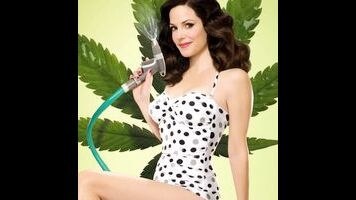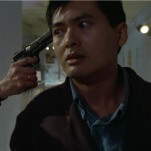While I have been frustrated with many parts of the seventh season of Weeds, what I consider to be the season’s central character arc has more or less been successful. When Silas announces to his mother that he’s going to be branching out on his own, making himself into Nancy’s competition now that the Pouncy House has been taken care of, it’s the latest in a string of character developments that have finally elevated Hunter Parrish into the male lead position that was left vacant after Romany Malco disappeared (which, arguably, happened before he left the show) and which Justin Kirk has never held in any sustained fashion.
The conclusion of “Une Mére Que J’aimerais Baiser” – which, in case you're reading this without having seen the episode, is French for "M.I.L.F." – feels like the kind of story move that Showtime thinks could justify future seasons, splitting the central family into two separate narratives that collide with one another on a regular basis. A few seasons ago, I would have been fairly skeptical about this development, and even last season it didn’t seem like Parrish or Silas could carry any substantial narrative weight independent of the main drive of the season. However, over the course of the seventh season Parrish has acquitted himself quite well, and Silas has been the one character who has been allowed to confront his issues in a way that resonated across the series’ run. This truly has been the “Season of Silas,” and the way this week’s episode allows that piece of the puzzle to fall into place in the end is a strong step forward.
In truth, the episode as a whole was a marginal step forward, although I’m not convinced that the rest of the episode is as well-connected to meaningful story arcs. With Silas, the story engine that drives his actions feels internal as opposed to external: Although there have been some instances (like his dalliance with Emma) where his actions become stupid for the sake of creating a particular narrative dilemma, we can trace his motivations to his issues with Nancy and his desire to assert himself. While he followed the rest of the family to New York City, and his return to the drug business was a result of Nancy’s desire to return to the drug business, he has made a concerted effort to follow his own path within the seasonal structure, which has made for an organic and clear character arc. That, really, is the ideal for a show like Weeds: While individual episodes may be dissatisfying, the macro-level storytelling can often help smooth over earlier rough spots.
The problem, however, is that finding a similar character arc with anyone else on the show this season is nigh impossible. The basic structure of “Une Mére Que J’aimerais Baiser” is actually very familiar for the show, as Nancy shifts her product towards an upscale market in the Hamptons during a weekend getaway. Andy and Doug come along for the ride, which harkens back to the Agrestic days on a number of levels. There’s a fair deal of class commentary in regards to the rich clientele who are willing to shell out enormous amounts of money for weed with a French name stored in a fancy box, and just having a social gathering in which multiple characters mingle with separate goals is something the show hasn’t done since earlier seasons when it was more settled.
While this storyline wasn’t terrible, and part of me was pleased to see the show getting back into old rhythms, it felt awfully pedestrian for a show that has been so willing to reinvent itself. You can see the show angling to provide a more self-sustaining storyline model, but unlike with Silas everything with Nancy is — to return to a concern I voiced earlier in the season — incredibly transparent. Allowing the hedge fund to support Nancy would provide a steady flow of income, justify keeping Doug around, and help build a new stable of spaces in which the show can tell its stories. However, from the beginning the Vehement storyline has felt more convenient than comprehensive, and more recent developments have done nothing to make me more excited about the prospect of spending more time there. This isn’t pieces coming together, it’s pieces being moved into place, and the difference is striking when the A-Plot of the episode is built around it.
As much as the show does have momentum heading towards the finale, provided mainly by Silas’ announcement, the rest of the storylines are reaching points that don’t feel as though they have the same logical motivations as the prodigal son’s departure. I know what they’re doing with Andy here, as he gets drunk and starts talking about his interdependent relationship with Nancy, but how are we supposed to trace that through the season? The bike shop was a narrative non-starter, his psychotic break last week was poorly contextualized, and who even remembers his relationship with Lindsay Sloane at this point? Instead of making any attempt at tying things together, the show is just returning to an earlier point in the character arc and pretending that everything to this point was something other than a stall tactic. Andy’s storyline here wasn’t bad, as his efforts to be someone else force him to reflect back on himself, but it held no weight in regards to the season as a whole.
This is the point where I am totally open to the season being redeemed, where the pieces start to fall into place and earlier complaints start to fade away. However, this episode wasn’t the point where that started, and even Silas’ big motivation felt less like a culmination of the seasonal arc and more an effort to spin that arc off into something more self-sustaining to potentially justify future seasons. I almost worry that the show will be too busy trying to justify its future — wrangling things as they see fit — to be able to wrap up what they have to this point.
I understand that these transition seasons are sometimes necessary, and think the writers deserve some leeway in terms of figuring things out, but there needs to be more life in these storylines for me to suggest that they are writing the best potential transition season. Arcs can be more free-formed, like Andy’s, but they shouldn’t feel as though they have no form, and no parts of the season should feel wholly pointless. They have two more episodes to fix that problem, but right now I’m still apprehensive about the show’s future: They might be preparing to wrap the season up in a pretty bow and put it in a fancy box, but I’m not necessarily preparing to buy it.
Stray Observations
- The speed at which Nancy shot down Silas’ idea felt a bit strange, but it was used as a justification for hastening his independence, which feels like a smart thing to do. It was also another nice, nuanced scene for Silas and Nancy.
- Not a huge shocker that Emma would discover that her arrest had something to do with the Botwins, but I’m interested to see just what the show plans to do with it. The entire bust was a non-event — a bust, if you would — given that we knew it was happening and the show didn’t actually end up putting Silas in harm’s way (despite the fact that he slept with her again), though.
- Maybe it’s just me, but while there are elements of nostalgia in returning to the class issues Weeds dealt with in the past, I sort of feel like the show has evolved beyond caricatures in general. The writers disagree, and keep writing them (as they did last season, so this isn't new), but I just don’t feel like playing Nancy off of them is giving the character anything new to do.
- Remember when Nancy was battling for custody of her son? I wonder when we’re going to get back to that.
- Nice to see the return of Bill Sussman — a small, but fun, callback.
- I’m just going to come out and say it: Alexander Gould has been kind of terrible this season, right? That scene where he was describing the bust to Silas was just not good, period.
- The credits song: Everest’s “Unfortunate Sea.”








































